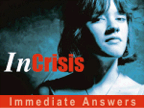|
 |
Wilderness Therapy:
Critical Evaluation And Treatment Issues That Are Overlooked
Wilderness
Therapy Treatment - A
non-profit consumer protection information, health, safety,
referral & education site.
Comprehensive Information:
http://www.WildernessTherapy.Org
|
By: Michael Conner, Psy.D
Mentor Research Institute
Revised:
May 21, 2014
Wilderness Therapy has at least a 10 year history of working with youth at
risk who demonstrate behavioral problems that are most typically
characterized as oppositional, defiant, antisocial and conduct related.
Until recently, wilderness based treatment interventions for mental
health problems were largely unrecognized by health care. The use of
Wilderness Therapy as an intervention and treatment model for mental health problems such as depression,
anxiety and substance abuse is of growing concern as wilderness programs
increasingly admit students with behavioral problems who also have
co-morbid (concurrent) psychological and medical problems.
(For more information see "Defining
A Safe Wilderness School, Therapy And Intervention Program")
The following is a brief outline of issues that programs and
consumers should become familiar with.
Medications
-
Misuse of medications. Students entering programs
(coming to programs)
are frequently on medications that are used to control behavioral
problems. Today's health care practices frequently use psychiatric medications to change thoughts, feelings and behavior without
dealing with more obvious but difficult social and interpersonal
causes. Many parents are not provided
with an adequate understanding of alternatives, the availability of
treatment resources and the risk or benefits of the medications their child
is taking. In a significant number of cases, children are given
medications to treat behavioral problems that are caused by family problems, social and peer interactions
in schools and peer social interactions outside school. If behavior
improves after taking a medication, then many parents and teachers conclude
that the medication is
necessary and effective.
-
Sedating side effects. Many
psychiatric
medications have side effects in other regions and organs in the
body. The associated
side effects (ASE's) of many medications are increasingly used to restrain
angry and impulsive behavior. Many children are placed on
antidepressant, antiseizure or antipsychotic medications that
have a powerful sedating effects beyond the intended psychological purpose of the
medication. The effect of sedation is often
perceived as an improvement by parents and primarily by teachers in
schools. The effect of these medications are not proven to be
significantly different in their behavioral impact than drugs like Valium and Xanex, but they
are more attractive because they carry a low physical addiction and
withdrawal risk. Many medications that are approved for adults are
given to children without Federal Drug Administration testing or approval.
-
Unqualified staff to monitor medication risk
and benefits. Wilderness guides
and instructors are generally not trained or qualified to work with students
who are taking certain medications - especially antipsychotic,
antimanics and antiseizure medications. While many of these medications may
have benefits, they all have side-effects and they can have potential
impacts on a student's immediate and long term physical and
psychological health.
-
Clinical oversight. Changing
medications, starting medications, changing the dosages, or discontinuing a medication in
the field can be dangerous without clinical oversight. In order to monitor
and evaluate the effectiveness of medications there must be qualified
professionals involved in assessing behavioral as well as mental and
emotional status. The most qualified professionals who can evaluate and
observe psychological and behavioral changes include a clinical
psychologist, psychiatric nurse, psychiatric nurse practitioner or psychiatrist.
- Wrong medications. Many of the
students who enter a wilderness program are often on the wrong medication
or should be taken off most or all of their medications. Today's
managed health care generally does not allow prescribing physicians adequate time, nor
do they train physicians to properly observe and evaluate children.
A 20 to 45 minute appointment that occurs two or less times a
month is not adequate to understand and treat the behavioral and
psychological problems. Medications trails are exactly that - trial
and error until a favorable effect is observed or reported.
Therapy and Counseling
-
Insuring that staff are qualified and
trained. Relying on an unlicensed or untrained therapist (or counselor) to assess and work with a child can be dangerous or diminish
the benefit of a wilderness program. To some extent, the personality
of a staff person, field guides or instructors can have a
dramatic impact of students. However, simply calling staff a counselor because
they provide counseling may in some case be more harmful that simply
exposing children to adversity of the wilderness without the
pretense of professional mental health care. Well meaning staff are not
necessarily qualified to evaluate, assess, interpret, confront and
redirect all behavior problems.
-
Crisis intervention. Crisis
Interventions in the field must be supervised and implemented by
qualified, experienced and licensed professionals. Anything less than
qualified interventions are potentially dangerous. Crisis
interventions conducted by untrained paraprofessionals are unsafe.
-
Appropriate treatment staff assignments. Students
with a history of a dramatic change in behavior, or a decline in
functioning, should be assigned to a licensed clinician who has
differential diagnostic experience and clinical experience working
with adolescents with psychotic, substance abuse and mood
disorders.
Family Therapy And Support
-
The environments children come
from usually need to change. While the environment that a child comes from may
or may not have been responsible for the child's current problems,
changing or improving the environment that a child returns to is essential
to insure that gains are not diminished. Family therapy and developing new
parenting skills that are strategic to a child's problems are important.
Children require clear and specific rules that are consistently enforced, as well as supervision
that is appropriate to their level of need. Structure, re-entry into the
family and support are crucial elements in a follow-up plan. Simply
releasing children back home without intervention or follow-up
support seems to explains lower success rates.
-
Family therapy and parent
training are essential to assure success. The gains in
wilderness are lasting for some students, but behavioral problems
require supervision and monitoring if a student returns home.
Follow-up from these programs represent a deterrent to behavioral
problems that are intentional, the result of family communication problems
or due to inadequate supervision.
Decompensation And Failure to Thrive
-
Wilderness therapy is not....
putting children in the wilderness is not therapy. The wilderness
has an innate ability to realign the behavior of children with nature,
the realities of life and their real self. However, wilderness
therapy is not a universal treatment for the problems that children
bring to the wilderness. There are certain problems that
will remain and require further treatment after a child
graduates.
-
Proper screening is critical.
Children who are not adequately screened and are unable to adapt to a
wilderness program are placed in danger of physical or psychological
harm. Screening by qualified professionals is an important
part of assuring your child's health, safety and well-being.
Consider this resource before you
spend a lot of money

www.InCrisis.Org
Copyright 2000 to 2011, Michael G. Conner |

